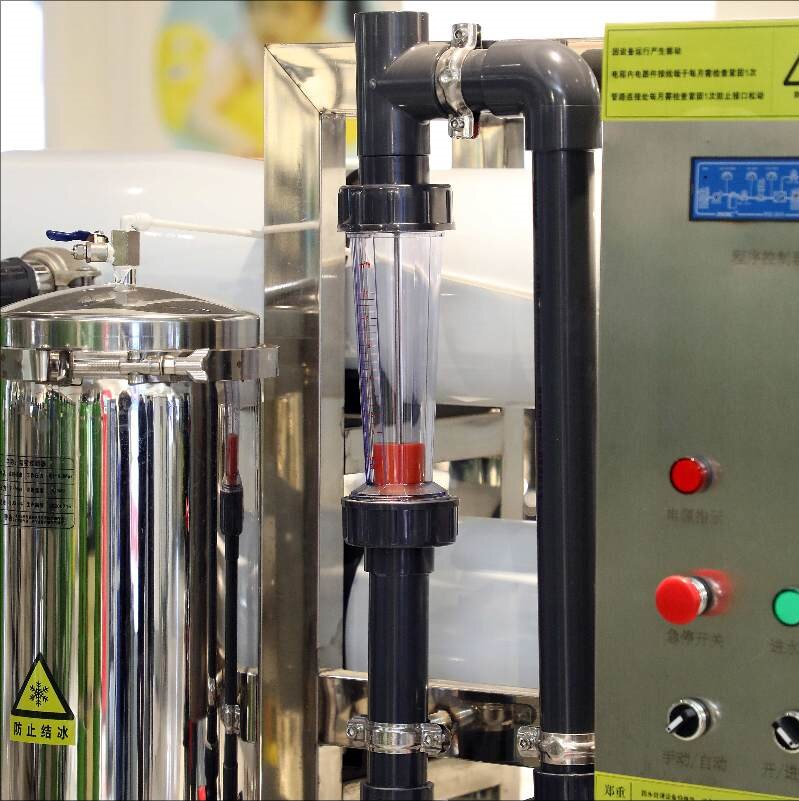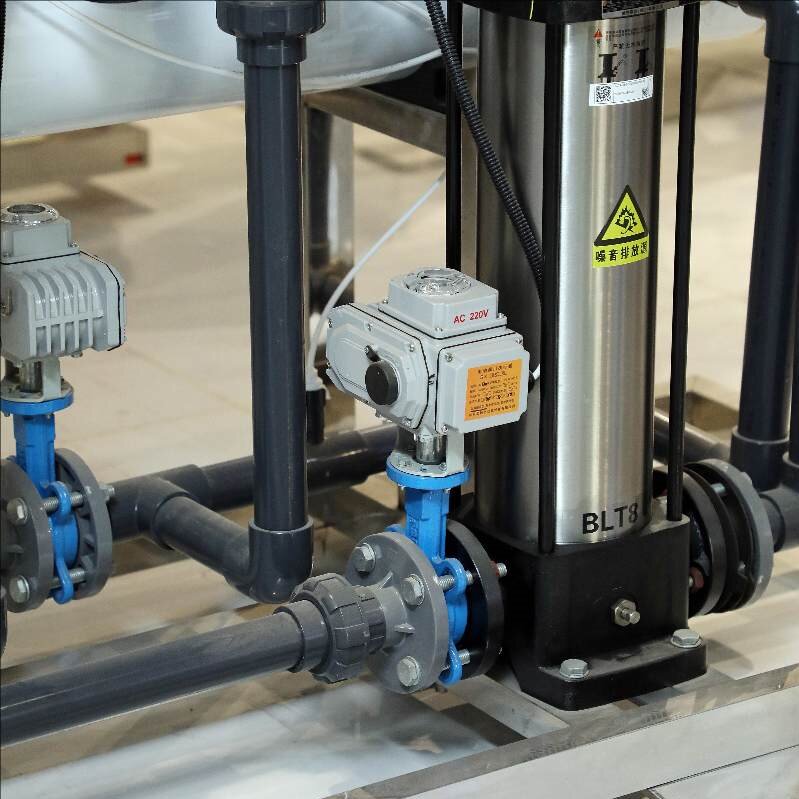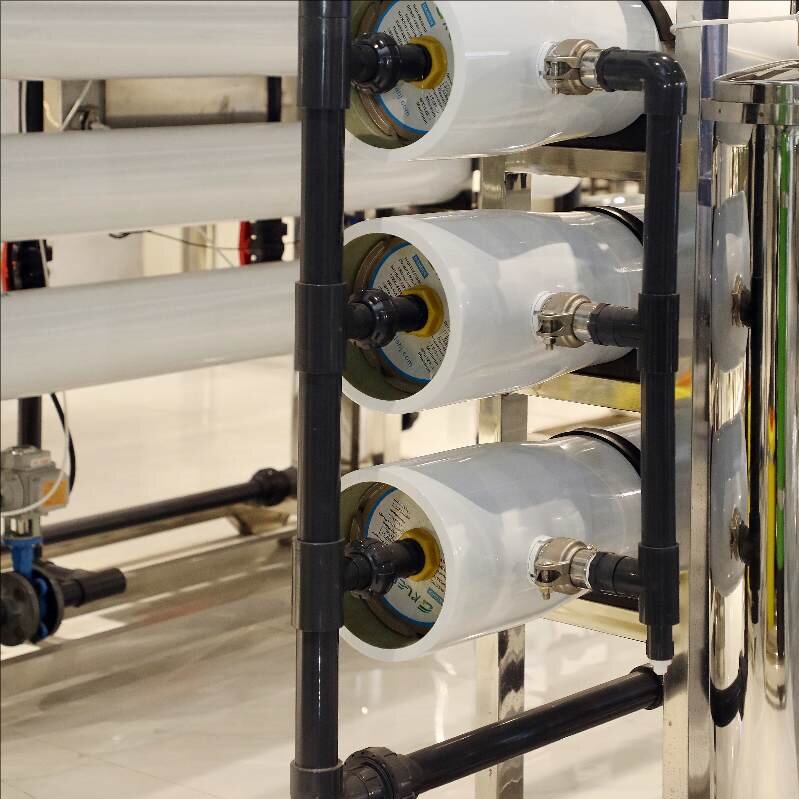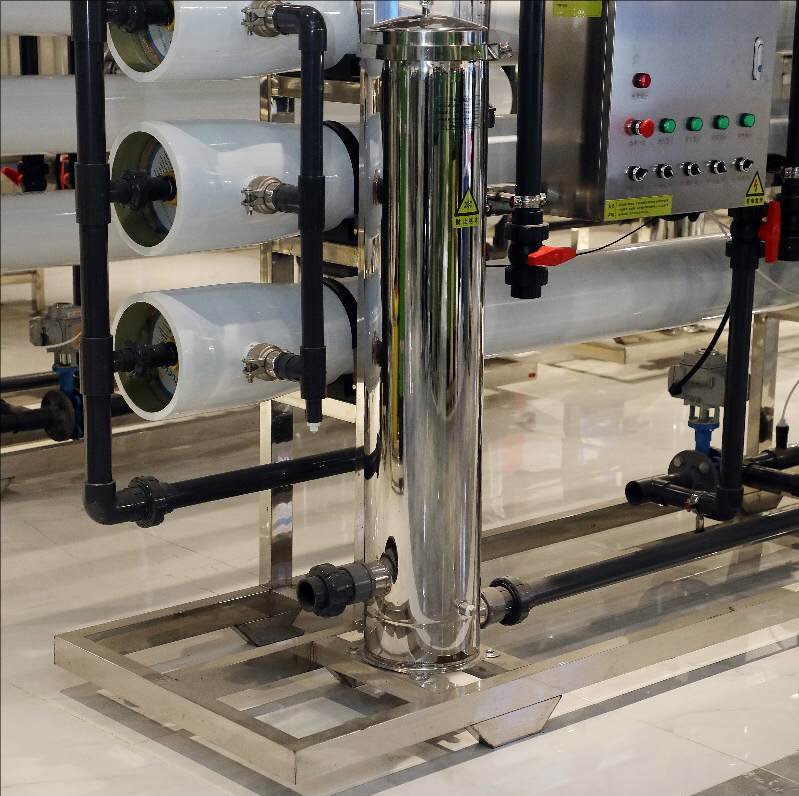
- Qingqingquan
- Shandong
- 20 days
- 300 units per month
Automatic two-stage reverse osmosis water purification equipment, two-stage RO tandem purification step by step, full automation, high purity and low consumption of produced water, suitable for food and beverage water needs
Automatic 2-Stage RO System | Food & Beverage Industry
I. Automatic Dual-Stage Reverse Osmosis Systems Process Flow

Raw water tank → raw water pump → quartz sand filter → activated carbon filter → softening filter → security filter → first high-pressure pump → first reverse osmosis device → intermediate water tank → second high-pressure pump → second reverse osmosis device → purified water tank → UV ultraviolet sterilizer → purified water transfer pump.
Ⅱ. Automatic Dual-Stage Ro Systems Process Description
1. Raw water tank
external network water storage device, equipped with high and low water level controller. When the water level is lower than the set value, the system automatically stops to prevent water pump damage due to lack of water.
2. Raw water pump
provides stable water supply pressure, with built-in overload protector, and serves as the power source for filter backwashing to ensure continuous operation of the system.
3. Quartz sand filter
removes suspended solids, sediment, insoluble colloids and algae from the water, reduces the SDI value, and the turbidity of the effluent water is ≤5NTU, which guarantees the life of the subsequent membrane module.
4. Activated carbon filter
Adsorb foreign color, odor, residual chlorine and some organic matter in the water, residual chlorine removal rate of 99.9%, to prevent oxidative decomposition of reverse osmosis membrane.
5. Softening filter
removes calcium and magnesium ions through ion exchange, reduces the hardness of raw water, prevents the RO membrane from scaling, and extends the service life of the membrane.

6. Security filter
intercepts particles larger than 5μm, prevents mechanical scratching and clogging of the reverse osmosis membrane surface, and ensures that the inlet water particles are up to standard.
7.PH adjustment and dosing device
add NaOH to adjust the pH value of the secondary reverse osmosis feed water, improve water production and water quality stability, and adapt to different water needs.
8. primary/secondary high-pressure pump
provides feed water pressure for reverse osmosis device to overcome osmotic pressure resistance. The primary pump serves the primary RO, and the secondary pump serves the secondary RO to ensure the designed water yield.
9. Reverse osmosis device
primary RO: removes more than 90% of dissolved salts and impurities, water conductivity ≤ 20μs/cm.
secondary RO: further desalination (desalination rate ≥ 98%), water conductivity ≤ 5μs/cm, water is close to the standard of pure water.
The system is equipped with valves, instruments and program control system to achieve long-term stable operation.
10.Intermediate water tank
Store the first RO water, buffer water fluctuation, equipped with high/low water level controller to realize automatic start/stop.

11.Purified water tank
adopts stainless steel aseptic water tank to store secondary RO water, high/low water level control to ensure the safe operation of the system.
12. Automatic low-pressure flushing and chemical cleaning device
Automatic flushing: flush the membrane surface for 30 seconds every 2 hours or at startup to prevent the accumulation of pollutants.
Chemical cleaning: regular cleaning of the RO membrane to extend the service life.
13. Pure water transfer pump
provides pressure for pure water transfer to ensure stable water supply at the water point.
14.UV sterilizer
kills bacteria and decomposes residual ozone to ensure that the microbiological indicators of produced water meet the standards.
15.Electronic control system
integrates automatic and manual control modes, equipped with chain protection and online monitoring (such as inlet conductivity, water resistivity), real-time response to system anomalies.

Ⅲ. Process characteristics
1. Two-stage reverse osmosis in series: improve water quality step by step, desalination rate ≥ 98%, to meet the demand of high purity water in food and beverage industry.
2. Pre-treatment enhancement: quartz sand, activated carbon, softening triple filtration, effective protection of RO membrane, reduce operation and maintenance costs.
3. Automation control: monitoring the whole process from raw water storage to pure water delivery, realizing unattended operation.
4. Modular design: adapting to different water production requirements, strong scalability, easy maintenance and upgrading.
Through physical filtration and membrane separation technology, the equipment efficiently removes impurities, microorganisms and dissolved solids from the water, and the produced water complies with the Hygienic Standard for Domestic Drinking Water and the norms for water used in the food and beverage industry, which provides a reliable guarantee for production safety.










































